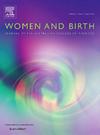助产士接受产科护理的经历及其整体分娩经历的预测因素。
IF 4.4
2区 医学
Q1 NURSING
引用次数: 0
摘要
背景:关于助产士接受产科护理经验的研究有限。助产士可能会在一定程度上把自己的个人生活带入工作,包括自己的分娩经历。目的:探讨助产士分娩和接受产科护理的经验及整体分娩经验的预测因素。参与者:在完成助产学教育后,在澳大利亚产科护理系统内经历了第一次分娩的助产士,年龄在18岁以上,英语流利。方法:采用描述性统计、多元回归分析和Kendall's tau相关研究对全国在线调查数据进行分析。调查结果:共纳入447名助产士的回复。总体而言,85% %的助产士报告了积极的分娩经历,12. %的助产士报告了消极或创伤性的分娩经历,2.5% %既不积极也不消极。整体分娩经验的五个重要预测因素是:正常的阴道分娩,对其专业能力有信心的产科护理提供者,接受他们选择的产科护理方案,能够使用专业知识与护理提供者进行质疑和谈判,并控制他们的护理。总体而言,27.1 %的助产士报告在任何一个或多个时间点感到被胁迫。对产后护理的满意度与整体分娩经历的相关性最强。讨论:助产士似乎将分娩视为一种总体积极的体验,这可能是由于她们在选择知名和值得信赖的个人护理提供者方面具有高度的代理和自主权;然而,对可能的并发症的了解可以解释报告的高强迫程度。助产士可能需要投入更多的资金来获得良好的产后支持,因为这似乎对她们的整体分娩体验有最大的影响。本文章由计算机程序翻译,如有差异,请以英文原文为准。
Midwives’ experiences of receiving maternity care and predictors of their overall birth experiences.
Background
Limited research has been conducted on midwives’ experiences of receiving maternity care. Midwives may bring a degree of their own personal lives to their work, including their own birthing experience.
Aim
To explore midwives’ experiences of giving birth and receiving maternity care and predictors of overall birth experience.
Participants
Midwives who, after completing their midwifery education, experienced their first birth within the Australian maternity care system, were female, over the age of 18, and fluent in English.
Methods
Data from an online national survey were analysed using descriptive statistics, multiple regression analysis, and Kendall’s tau correlation studies.
Findings
In total, 447 midwives’ responses were included. Overall, 85 % of midwives reported positive birth experiences, 12.5 % a negative or traumatic birth experience, and 2.5 % neither positive nor negative. Five significant predictors of overall birth experience were: having a normal vaginal birth, maternity care providers who instilled a sense of confidence in their professional competence, receiving the maternity care options of their choice, being able to use professional knowledge to question and negotiate with care providers, and having control over their care. Overall, 27.1 % of midwives reported feeling coerced at any one or more points of time. Satisfaction with postnatal care was most strongly correlated with overall birth experience.
Discussion
Midwives appear to experience birth as an overall positive experience, and this could be due to their high level of agency and autonomy in choosing a known and trusted individual care provider; however, knowledge of possible complications could explain high levels of reported coercion. Midwives may need to invest more in getting good postnatal support in place, as this appeared to have the greatest impact on their overall birth experience.
求助全文
通过发布文献求助,成功后即可免费获取论文全文。
去求助
来源期刊

Women and Birth
NURSING-OBSTETRICS & GYNECOLOGY
CiteScore
7.20
自引率
13.20%
发文量
371
审稿时长
27 days
期刊介绍:
Women and Birth is the official journal of the Australian College of Midwives (ACM). It is a midwifery journal that publishes on all matters that affect women and birth, from pre-conceptual counselling, through pregnancy, birth, and the first six weeks postnatal. All papers accepted will draw from and contribute to the relevant contemporary research, policy and/or theoretical literature. We seek research papers, quality assurances papers (with ethical approval) discussion papers, clinical practice papers, case studies and original literature reviews.
Our women-centred focus is inclusive of the family, fetus and newborn, both well and sick, and covers both healthy and complex pregnancies and births. The journal seeks papers that take a woman-centred focus on maternity services, epidemiology, primary health care, reproductive psycho/physiology, midwifery practice, theory, research, education, management and leadership. We also seek relevant papers on maternal mental health and neonatal well-being, natural and complementary therapies, local, national and international policy, management, politics, economics and societal and cultural issues as they affect childbearing women and their families. Topics may include, where appropriate, neonatal care, child and family health, women’s health, related to pregnancy, birth and the postpartum, including lactation. Interprofessional papers relevant to midwifery are welcome. Articles are double blind peer-reviewed, primarily by experts in the field of the submitted work.
 求助内容:
求助内容: 应助结果提醒方式:
应助结果提醒方式:


